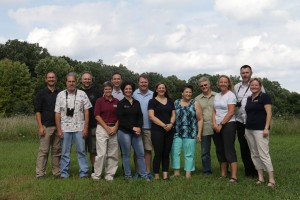Paving the way for international oiled wildlife response assistance

The third meeting of experts involved in the Global Oiled Wildlife Response System (GOWRS) project took place last month in Delaware, USA.
The project– a two-year initiative funded by the International Association of Oil and Gas Producers (IOGP) as part of the Oil Spill Response Joint Industry Project (OSR-JIP) – aims to design an international system for oiled wildlife response expertise that can be mobilized for assistance in complex oiled wildlife scenarios.
The meeting was kindly hosted by Tri-State Bird Rescue Research Inc. – one of the GOWRS project partners – in the new Oiled Wildlife Response Annex at their facility in Newark, Delaware.
The focus of the meeting was two-fold. Much time was spent discussing on-going work and dividing remaining tasks for the successful completion of the project by the end of 2016. The other objective of the week was to develop a work schedule for activities in the follow-up project, which is scheduled to start in January 2017 and run for another two years. The aims of that project will be to test the Standard Operational Procedure via exercises, discuss training programmes, readiness and membership, and to initiate exchanges with end users. Funding for the follow-up programme will be provided by the shareholders of Oil Spill Response Limited (OSRL).
The GOWRS initiative aims to develop a global oiled wildlife response system that can be accessed by the oil industry and other stakeholders in the event of an oil spill incident requiring international wildlife response resources (Tier 3 response). The system utilizes and augments the response capability of existing wildlife response organisations through a collaborative approach which includes a common operating procedure and shared standards that allow for unity of effort in the event of a multi-organisational response.
The intention is for this international (Tier 3) approach to serve as a complement to local and national wildlife response programmes, which serve as the foundation for good practice in oiled wildlife preparedness and response.
The GOWRS Project Partners include:
Aiuká, Brazil
Focus Wildlife International, USA & Canada
International Bird Rescue, USA
Oiled Wildlife Care Network, Wildlife Health Center, UC Davis, USA
PRO Bird, Germany
RSPCA, UK
SANCCOB, South Africa
Sea Alarm Foundation, Belgium (Project Coordinator)
Tri-State Bird Rescue & Research Inc., USA
Wildbase, Massey University, New Zealand
Wildlife Rescue Centre Ostend, Belgium
The project partners wish to thank IOGP for their support in improving oiled wildlife response preparedness through the OSR-JIP project, as well as the members of Oil Spill Response Limited for their willingness to continue supporting the development of the Global Oiled Wildlife Response System in the future.
